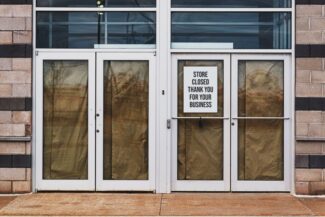While this time of year is the busy season for shopping, the reality is that the retail sector is in major turmoil. Recent store closures and bankruptcies are dominating headlines and raising serious questions about the state of the economy. In 2024 alone, over 2,000 retail locations shut their doors, with experts predicting as many as 45,000 closures by the decade’s end. Iconic names like Big Lots, Party City and 99 Cents Only Stores are some of the many well-known casualties.
 Big Lots filed for bankruptcy and announced it would close all 963 of its locations, while Party City, grappling with its second bankruptcy in less than two years, is winding down operations at its 700 stores. Even discount giants like 99 Cents Only Stores, once a go-to for budget-conscious shoppers, are scaling back, shuttering 371 locations due to inflationary pressures and changing consumer habits. Furniture retailer American Freight has also failed, closing all 328 of its locations as its parent company faces financial collapse.
Big Lots filed for bankruptcy and announced it would close all 963 of its locations, while Party City, grappling with its second bankruptcy in less than two years, is winding down operations at its 700 stores. Even discount giants like 99 Cents Only Stores, once a go-to for budget-conscious shoppers, are scaling back, shuttering 371 locations due to inflationary pressures and changing consumer habits. Furniture retailer American Freight has also failed, closing all 328 of its locations as its parent company faces financial collapse.
This retail reckoning isn’t just about mismanagement or bad luck—it’s the result of broader economic pressures and shifting consumer behavior. Inflation continues to eat away at household budgets, leaving less room for non-essential spending. At the same time, e-commerce giants like Amazon have rewritten the rules of retail with their convenience and aggressive pricing, pulling shoppers away from traditional brick-and-mortar stores.
Post-pandemic habits have only accelerated these trends as more people embrace online shopping, home convenience, curbside pickups, and a focus on value-driven purchasing. For many retailers, it’s simply become too expensive, and too challenging, to maintain physical locations in this new reality.
The implications of these closures go far beyond the retail floor. Thousands of workers are losing their jobs, many of them in communities where retail employment has historically been one of the biggest anchors. Vacant storefronts are becoming an increasingly common sight, and declining commercial property values are the norm. And for consumers, the fallout means fewer choices, diminished access to in-person shopping, and, in some cases, higher prices due to reduced competition.
As we close out 2024 and head into 2025, these retail closures paint a larger picture of economic fragility. A slowdown in consumer spending — often seen as a bellwether for broader economic health — suggests that many households are feeling the pinch. Business bankruptcies and consolidations are piling up, signaling that even established brands are struggling to adapt to rising costs and a volatile market. It’s a clear reminder that the retail sector, once the heart of Main Street America, is now a microcosm of a more profound economic shift.
So, how do we prepare for 2025 in this uncertain environment? Start by taking stock of your financial situation. As costs continue to rise, focus on building a budget that accounts for the unexpected and ensures you have a cushion for the year ahead. Look for opportunities to shop smarter, whether that’s supporting local businesses to keep your community thriving or leveraging online deals to stretch your dollar further.
Finally, think about ways to future-proof your skills and income. If 2024 has taught us anything, it’s that adaptability is everything. Consider how you can invest in education, training or even a side hustle to stay ahead in a changing economy. The retail landscape may be shifting, but with preparation and resilience, there’s no reason 2025 can’t be a year of growth and opportunity!
Would you rather have a large local megastore that offers reduced prices and bad service or shop in smaller mom-and-pop establishments with exceptional customer service? Please email or message me to let me know your choice. Also, please let me know if you have a good “Would you rather” question, and we will highlight your submission.
 Shmuel Shayowitz (NMLS#19871) is President and Chief Lending Officer at Approved Funding, a privately held local mortgage banker and direct lender. Approved Funding is a mortgage company offering competitive interest rates as well as specialty niche programs on all types of Residential and Commercial properties. Shmuel has over 20 years of industry experience, including licenses and certifications as a certified mortgage underwriter, residential review appraiser, licensed real estate agent, and direct FHA specialized underwriter. He can be reached via email at Shmuel@approvedfunding.com.
Shmuel Shayowitz (NMLS#19871) is President and Chief Lending Officer at Approved Funding, a privately held local mortgage banker and direct lender. Approved Funding is a mortgage company offering competitive interest rates as well as specialty niche programs on all types of Residential and Commercial properties. Shmuel has over 20 years of industry experience, including licenses and certifications as a certified mortgage underwriter, residential review appraiser, licensed real estate agent, and direct FHA specialized underwriter. He can be reached via email at Shmuel@approvedfunding.com.
Please Complete This Form To Get In Touch With Shmuel


















